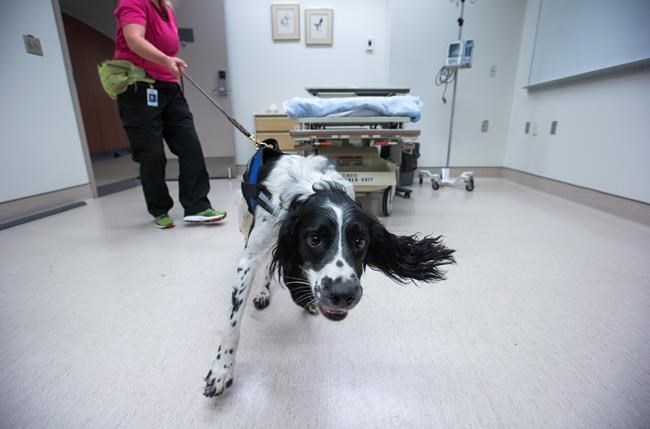
Canada's first C. difficile sniffing dog, Angus, searches a mock patient room with his owner and trainer Teresa Zurberg, a former C. difficile patient, during a demonstration at Vancouver General Hospital in Vancouver, B.C., on Tuesday July 5, 2016. The two-year-old field-bred English Springer Spaniel will be used at the hospital to help battle the infection that is a concern because it attacks people whose immune systems have been compromised by antibiotics.
Image Credit: THE CANADIAN PRESS/Darryl Dyck
July 06, 2016 - 6:00 AM
VANCOUVER - A Vancouver hospital is targeting C. difficile infections by deploying a detection dog to sniff out the superbug that's notorious for spreading in health facilities.
Angus, a two-year-old English springer spaniel, is believed to be the world's only dog trained to track the scent of the potentially deadly bacterium in hospitals.
His skill will enhance the capabilities of three cleaning robots used by Vancouver General Hospital to eradicate C. difficile, which is invisible to the naked eye.
"He's extremely persistent, he's very independent, nothing stops him," his owner, Teresa Zurberg, told reporters Tuesday after leading Angus through an odour-detection demonstration.
"What really gets me is when I have patients and families and friends come up and say, 'Hey, I have C. diff or my grandma died from C. diff, that's really cool what you're doing.' So hopefully it can help save some other lives."
C. difficile attacks people with immune systems weakened by antibiotics and is the most common cause of infectious diarrhea in hospitals. Its most severe effects can require colon surgery and even lead to death.
Hospitals in the Vancouver region treat about 700 cases each year, with about 30 per cent originating outside facilities, said Dr. Elizabeth Bryce, medical director for infection control with Vancouver Coastal Health.
"Clostridium difficile is a bacteria that is able to form spores. Therefore, it is resistant to a lot of our cleaning agents and it can persist in the environment for a long period of time," Bryce said.
Vancouver General already uses three UV-light disinfecting robots, but they can't possibly cover the entire hospital, she said.
"We can now use Angus to help us detect the reservoirs, and then we can use the additional cleaning and the ultraviolet light a little more strategically."
Angus will start by working in areas where he can search with few distractions, such as unoccupied patient rooms, medication rooms and hallways, Bryce said.
Zurberg, who is a certified trainer of bomb and drug-detecting dogs, came up with the idea with her husband after she nearly died from a C. difficile infection three years ago.
She became sick after taking high doses of antibiotics to treat a big gash on her leg. She was rushed to hospital, where she lost nine kilograms in five days and remained ill for several months.
Her husband Markus Zurberg, who works as a patient safety co-ordinator for Vancouver Coastal Health, found an article online about a dog named Cliff in Amsterdam who was trained to sniff C. difficile on patients. He posed the possibility to his wife of training a dog to work in hospitals.
"I told him, 'If it's got a smell I can teach a dog to find it,' " she said.
They acquired Angus in Montana and Teresa Zurberg trained him for about 18 months.
She said Angus has the same risk of contracting C. difficile as humans, but she's not worried because his immune system is not compromised.
"It's a calculated risk, and he's at very low risk to get it," she said, adding Angus is seen by a veterinarian regularly.
She hopes his high success rate will ultimately prompt other health authorities to get dogs trained to detect C. difficile.
News from © The Canadian Press, 2016